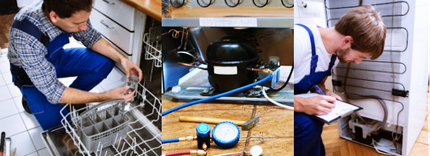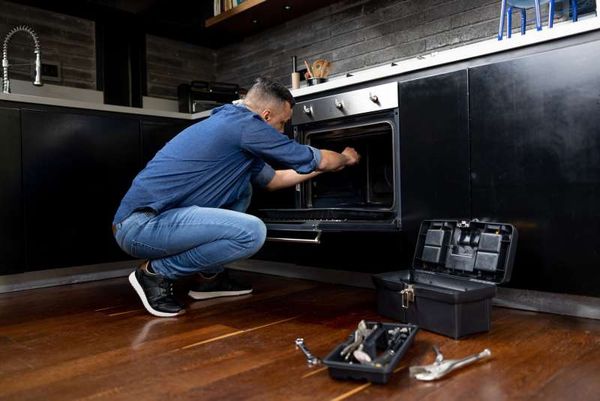The Ultimate Overview to Understanding Device Repair Service in the house
When your fridge stops cooling or your stove refuses to heat, it can feel overwhelming. Recognizing device repair work at home can save you money and time. You'll discover to acknowledge signs and symptoms, make use of essential tools, and follow a methodical troubleshooting procedure. Yet before you start, there are vital safety and security precautions you need to take into consideration. What are one of the most usual issues, and exactly how can you fix them? Let's discover the essentials.
Usual Appliance Issues and Their Signs and symptoms
When your devices begin breaking down, it's vital to identify the indicators early on. Disregarding them can cause larger problems and expensive fixings. For instance, if your refrigerator isn't cooling appropriately, you could discover cozy areas or condensation creating. This might indicate a falling short compressor or a blocked vent.Your dishwashing machine might reveal issues with dirty recipes or unusual sounds during cycles. If you listen to grinding or clanking, it's time to investigate.A cleaning device that won't spin or drain pipes can leave you with soggy laundry, recommending a clogged drainpipe or a malfunctioning pump.Lastly, if your stove's temperature level appears off or it takes permanently to pre-heat, you could be dealing with a defective thermostat. By remaining alert to these signs and symptoms, you can deal with concerns prior to they intensify into major repair services.
Crucial Devices for Appliance Repair Service
When you're taking on appliance repair work at home, having the right tools is crucial. Basic hand tools like screwdrivers and pliers will aid you dismantle and repair numerous appliances, while electric screening devices guarantee you're working safely with wiring. Allow's go over what you need to begin on your fixing journey.
Fundamental Hand Devices
Having the right devices is vital for efficient appliance repair at home. Beginning with a trustworthy screwdriver collection, consisting of both flathead and Phillips types, as screws prevail in home appliance assembly. Pliers are likewise crucial; they aid with gripping, turning, and reducing cables or small components. A pair of needle-nose pliers can get to difficult situations easily. You'll require an excellent adjustable wrench for tightening up or loosening up nuts and screws. An utility blade is helpful for puncturing product packaging or insulation. Lastly, don't fail to remember a strong workbench or surface area to securely organize your tools and components. With these basic hand tools, you'll be well-prepared to take on most device fixings that come your means.
Electrical Screening Instruments
Along with standard hand tools, electrical screening tools play a necessary duty in device repair work. These tools help you identify electric issues and guarantee devices operate securely. A multimeter is essential; it determines voltage, present, and resistance, permitting you to identify problems quickly. A non-contact voltage tester is one more essential, allowing you discover online wires without making straight call, boosting your security. Secure meters are fantastic for measuring present circulation in cords without separating them, saving you effort and time. Additionally, circuit testers can quickly inspect if electrical outlets are functioning appropriately. By making use of these devices, you'll improve your troubleshooting process and enhance your repair work abilities, making appliance maintenance a lot much easier.
Step-by-Step Guide to Diagnosing Appliance Issues
When your appliance breaks down, it can be frustrating, but detecting the problem does not have to be frustrating. You'll learn to recognize common problems and apply effective troubleshooting methods. Let's walk through the steps to obtain your home appliance back in functioning order.
Typical Device Issues

Troubleshooting Strategies Clarified

Repairing Major Kitchen Area Devices: A Closer Look
Have you ever before questioned just how to deal with usual problems with your kitchen area devices? Repairing major kitchen area devices like fridges, stoves, and dishwashing machines can be easier than you assume. Start by determining the issue-- whether it's a refrigerator not cooling down or an oven that won't heat up. Frequently, an easy reset or inspecting the source of power can solve the issue.For refrigerators, clean the condenser coils and examine the door seals. If your oven's not home heating, check the burner and thermostat. Dish washers could just need a tidy filter or a reset to get them back in activity. Always unplug the device prior to diving right into repairs to guarantee your safety.Don' t neglect to speak with the user manual for specific troubleshooting tips associated with your version. With a little bit of perseverance and the right tools, you can with confidence tackle home appliance repair work and conserve money at the same time!

Repairing Washing Devices: Tips and Techniques
When your laundry devices begin breaking down, it can feel overwhelming, but fixing them does not need to be a headache. Start by examining the power supply. Confirm the device is connected in and the electrical outlet is operating. Next, check the door or lid switch; a defective switch can protect against the machine from operating.For washing machines, if it's not spinning, look for out of balance tons. Rearranging the clothing may fix the issue. If your clothes dryer isn't heating, clean the lint filter and examine the air vent for blockages.Listen for uncommon noises; they can show a trouble. If your home appliance is leaking, inspect the hoses for cracks or loosened links. Paper any kind of mistake codes presented on electronic displays, as they can direct you in determining the problem. Consult the user manual for certain troubleshooting ideas connected to your version.
Security Precautions to Take Throughout Repair works
Before you start any kind of appliance fixings, it's necessary to prioritize safety to stop accidents or injuries. Unplug the appliance or turn off the circuit breaker to guarantee no power reaches it while you function. Usage shielded tools to reduce the risk of electric shock. Use safety goggles and gloves to safeguard yourself from sharp sides or debris (Dependable Refrigeration & Appliance Repair Service Dryer repair near me).Make specific your workspace is clean and well-lit, so you can see what you're doing. Keep youngsters and pet dogs away from the location to prevent distractions and possible dangers. If you're handling gas home appliances, be extra mindful; check for leaks before proceeding.Take your time, and do not hurry with repairs. If you feel unclear regarding any type of step, it's much better to stop briefly and research than to think. Complying with these preventative measures will aid develop a much safer setting for your do it yourself home appliance repair service job
When to Call an Expert for Assistance
How do you recognize if it's time to call in a professional for home appliance repair work? If you have actually tried basic troubleshooting without success, it's a clear indication. If your appliance still won't begin or shows uncommon sounds after resetting it, don't wait to look for expert help.When you see leakages, smoke, or shedding scents, focus on safety and security and call a pro immediately. These issues can bring about more substantial damages or posture threats to your home.Also, if your home appliance is under warranty, getting in touch with a specialist is often the very best path. They can guarantee that repair work will not nullify your guarantee, conserving you money in the long run.Finally, if you're unsure or uneasy with complex repair work, it's important to leave it to the professionals. Keep in mind, taking on complicated concerns without the best know-how can bring about costly blunders. Trust an expert when doubtful!
Regularly Asked Questions
How Can I Prevent Device Troubles in the Future?
To stop home appliance problems in the future, you must execute normal maintenance, check for wear and tear, tidy filters, and avoid overloading. Remaining aggressive will certainly aid extend their lifespan and keep them running efficiently.
What Are one of the most Usual DIY Home Appliance Repair Work Mistakes?
You could overlook safety preventative measures, skip repairing steps, or utilize inaccurate tools when trying DIY appliance repairs. Hurrying the procedure or disregarding manufacturer guidelines can lead to more substantial issues and expensive errors. Stay individual and educated!
How Do I Know if a Component Demands Substitute?
You can tell if a part needs replacement by examining for unusual noises, leakages, or inconsistent performance. If the home appliance battles more info to run correctly or reveals noticeable damages, it's likely time for a replacement.
Can I Use Generic Parts for Device Fixes?
Yes, you can make use of generic components for home appliance repair work, however identify they're suitable - Lg Dryer repair near me Dependable Refrigeration & Appliance Repair Service. Common components may save you cash, but they might influence efficiency or longevity, so consider your choices very carefully prior to deciding
What Service Warranties Cover Appliance Repairs?
Most appliance guarantees cover repair services for making issues, however they usually omit damage from misuse. Inspect your guarantee terms meticulously, as some could need using qualified professionals and initial components for insurance coverage to stay valid.
Comments on “Step-by-Step Vent Cleaning Tips – Dependable Refrigeration & Appliance Repair Service Dryer repair near me”